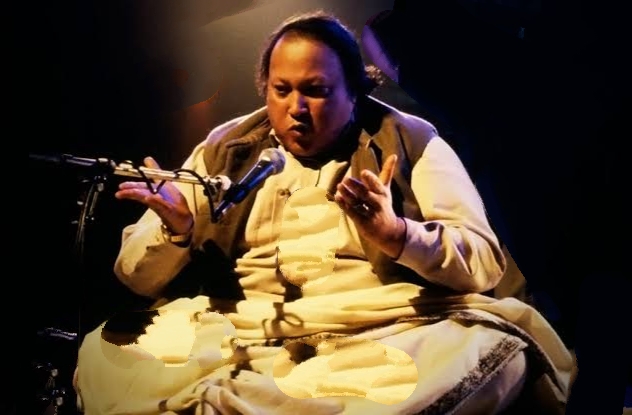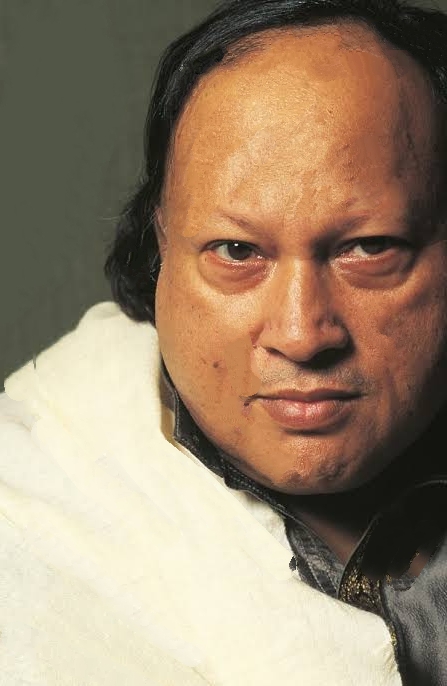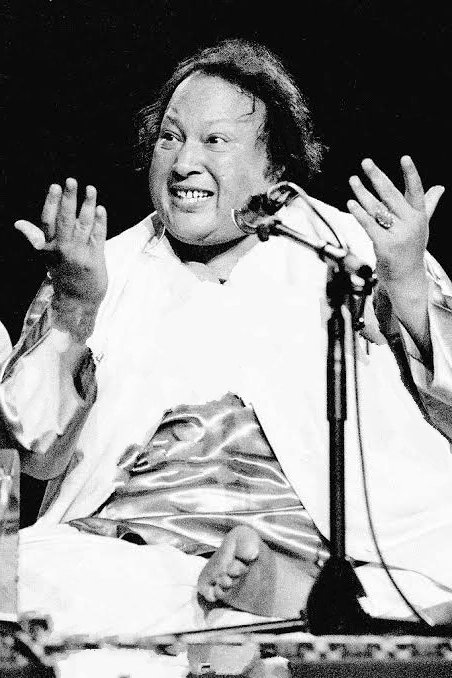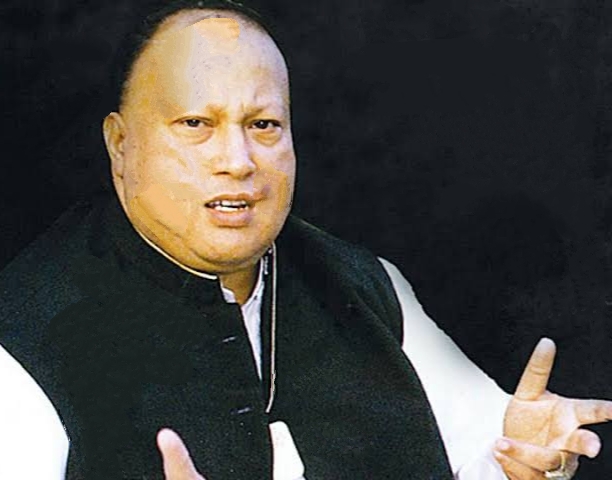
NUSRAT FATEH ALI KHAN : THE QAWWALI MAESTRO

Nusrat Fateh Ali Khan, often referred to as “Shahenshah-e-Qawwali” (The Emperor of Qawwali), was a legendary Pakistani musician who left an indelible mark on the world of music with his soul-stirring qawwali performances. Born on October 13, 1948, in Faisalabad, Pakistan, Nusrat Fateh Ali Khan’s life and career spanned several decades, during which he became an iconic figure in the realm of Sufi music. This article delves into the life, musical contributions, and enduring legacy of this extraordinary artist.
NUSRAT FATEH ALI KHAN
Early Life and Training:
Nusrat Fateh Ali Khan was born into a family with a rich musical heritage. He belonged to the Qawwal Bachchon ka Gharana, a prestigious lineage of qawwals (devotional Sufi singers). His father, Fateh Ali Khan, and uncle, Mubarak Ali Khan, were both revered qawwals, and they played a pivotal role in shaping Nusrat’s musical journey.
At the tender age of 16, Nusrat inherited the responsibility of leading the family qawwali group after his father’s untimely demise. Nusrat’s musical training was rigorous and demanding, involving the mastery of classical ragas and intricate rhythms. His voice was a divine gift, characterized by its incredible range, power, and emotional depth. His dedication to his craft and the spiritual essence of qawwali made him stand out even among the most talented artists of his generation.

The Evolution of Qawwali:
Qawwali, a form of Sufi devotional music, dates back several centuries and has its roots in the mystical traditions of Islam. Nusrat Fateh Ali Khan’s contribution to qawwali was transformative. He modernized and popularized the genre, introducing innovative elements while staying true to its spiritual essence.
Nusrat’s qawwali performances were known for their electrifying energy and deep spirituality. His renditions of Sufi poetry, often based on the works of renowned poets like Rumi and Bulleh Shah, had the power to transport listeners to a state of spiritual ecstasy. His ability to infuse each performance with a profound sense of devotion and love for the Divine touched the hearts of people across cultures and religions.
Global Recognition:
Nusrat Fateh Ali Khan’s fame extended far beyond the borders of Pakistan. He embarked on international tours, captivating audiences around the world with his mesmerizing qawwali performances. His collaboration with Western artists, such as Peter Gabriel and Eddie Vedder, further expanded his global reach. These collaborations bridged cultural gaps and introduced qawwali to new audiences, cementing Nusrat’s status as a global music icon.
Nusrat’s 1989 performance at the World of Music, Arts and Dance (WOMAD) festival in London was a defining moment in his career. It garnered critical acclaim and introduced him to a wider international audience. His concerts became cultural events, drawing fans from diverse backgrounds who were drawn to the spirituality and transcendental power of his music.

Legacy and Influence:
Nusrat Fateh Ali Khan’s influence on the world of music is immeasurable. He received numerous awards and honors during his lifetime, including the prestigious UNESCO Music Prize in 1995. His music continues to inspire countless artists, from various genres, to this day.
His nephew, Rahat Fateh Ali Khan, has followed in his footsteps and has achieved international acclaim as a qawwali artist. Nusrat’s unique style and devotion to the Sufi tradition have inspired musicians not only in Pakistan but also in India, the United States, and beyond.
His impact on world music is undeniable, and his recordings remain cherished treasures for music enthusiasts worldwide.Tragically, Nusrat Fateh Ali Khan’s life was cut short when he passed away on August 16, 1997, at the age of 48. However, his music lives on, continuing to touch the hearts and souls of those who listen to it. His recordings are regularly featured in films, documentaries, and television shows, ensuring that his legacy endures for generations to come.
In Conclusion:
Nusrat Fateh Ali Khan’s life and music are a testament to the power of devotion, talent, and spirituality. He elevated qawwali to new heights and shared its profound message of love, unity, and spiritual awakening with the world. His voice remains a source of solace and inspiration for countless individuals, transcending cultural and religious boundaries. Nusrat Fateh Ali Khan will forever be remembered as a true musical maestro and a spiritual luminary whose legacy continues to resonate with the hearts and souls of people around the globe.


